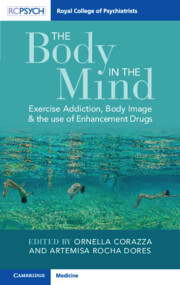
-
Select format
-
- Publisher:
- Cambridge University Press
- Publication date:
- March 2023
- April 2023
- ISBN:
- 9781911623731
- 9781911623724
- Dimensions:
- Weight & Pages:
- Dimensions:
- (190 x 120 mm)
- Weight & Pages:
- 0.25kg, 258 Pages
You may already have access via personal or institutional login
Book description
In a society that strives for appearance, fitness is increasingly viewed as a means to reach a certain aesthetic ideal, rather than a way to improve health and physical performance. Every day millions of posts appear on social media promoting a visual representation of apparently fit, healthy and 'perfect' bodies. Combining personal accounts, clinical cases, and scientific research, this book explores how such new trends in society can lead to the development of exercise addiction and body image disorders. It explains how such a concern with physical appearance can act as a precursor or be symptomatic of other conditions, such as eating disorders, mood disorders, and the use of performance and image enhancing drugs. It highlights throughout the importance of raising awareness amongst health professionals, including psychiatrists, psychologists, mental health nurses, social workers and primary care physicians, of this growing challenge to prevent harm and improve treatment.
Reviews
‘This book is a relatively easy-to-read overview of exercise addiction and associated psychiatric conditions that may be visible but not necessarily identified or targeted for treatment. It will help clinicians recognize and address these disorders in patients they are treating for other conditions, particularly those in the sports and fitness industry.’
Michael Easton Source: Doody's Reviews
Contents
Metrics
Altmetric attention score
Full text views
Full text views help Loading metrics...
Loading metrics...
* Views captured on Cambridge Core between #date#. This data will be updated every 24 hours.
Usage data cannot currently be displayed.
Accessibility standard: Unknown
Why this information is here
This section outlines the accessibility features of this content - including support for screen readers, full keyboard navigation and high-contrast display options. This may not be relevant for you.
Accessibility Information
Accessibility compliance for the PDF of this book is currently unknown and may be updated in the future.


